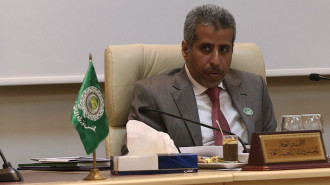Breadcrumb
Yemen PM returns to Aden under deal with UAE-backed southern separatists
The return from Riyadh of Prime Minister Maeen Abdulmalik Saeed and four other ministers, initially planned for last week but delayed for logistical reasons, follows the November deal with separatists who had chased the government out of the port city.
Abdul Malik has been residing in Saudi Arabia since the separatist Southern Transitional Council takeover of Aden.
The return has been delayed more than once over the past few days, with sources saying that the wait was due to security arrangements.
Earlier this month, Yemen's UAE-backed southern separatists signed a landmark power-sharing deal with the government.
Despite the Riyadh agreement, however, the separatists have reportedly hindered the return of the government, including by refusing to raise the country's national flag over key government institutions in the city.
The return date for the government stipulated in the Riyadh agreement had been last Tuesday.
 |
The deal aims give the STC given control of a number of ministries and 50 percent of posts in the country’s cabinet after years of discontentment in the south.
Read also: Yemen in Focus: UAE changes its tune on Houthi rebels following Riyadh agreement
The crisis of infighting heightened in August after separatists led a coup against the Saudi-backed Hadi government, taking military control of Aden and prompting clashes which saw dozens killed and injured from both sides.
UAE-backed Security Belt Forces, which is dominated by the STC, took control of Aden - a southern coastal city that had served as the beleaguered government's base since it was ousted by the Houthi rebels in 2014.
The clashes between the separatists and government forces, who for years fought on the same side against the Houthis, had raised fears the country could split into two entities.
Comment: UAE's true ambitions in Yemen take another blow
The STC then expelled internally-displaced Yemenis from the north of the country seeking refuge from the ongoing violence.
The Yemeni government has on several occasions accused Abu Dhabi of being behind what it called an "insurgency".
The warring factions in recent weeks held indirect talks mediated by Saudi Arabia in the kingdom's western city of Jeddah, which culminated in the deal signed in Riyadh.
Saudi Crown Prince Mohammed bin Salman has said the deal would "open a new period of stability in Yemen".
The UN special envoy for Yemen, Martin Griffiths, said it was "important to the political efforts to achieve peace in the country".






![Anthony Blinken speech [Getty] Anthony Blinken speech [Getty]](/sites/default/files/styles/image_684x385/public/media/images/6263436E-8ACD-4D3C-9055-25A7BE79DD5A.jpg?h=d1cb525d&itok=fLHmHCRG)
 Follow the Middle East's top stories in English at The New Arab on Google News
Follow the Middle East's top stories in English at The New Arab on Google News
![Maj Gen Ali Nour al-Din al-Naasan appointed new Syria's army chief [Twitter]](/sites/default/files/styles/image_330x185/public/2025-01/new%20Syrian%20nilitary%20chief.jpg?h=19839aca&itok=6tb5qhNB)
![Gaza death toll [Getty]](/sites/default/files/styles/image_330x185/public/2192491071.jpeg?h=a5f2f23a&itok=1V9vL9X5)
